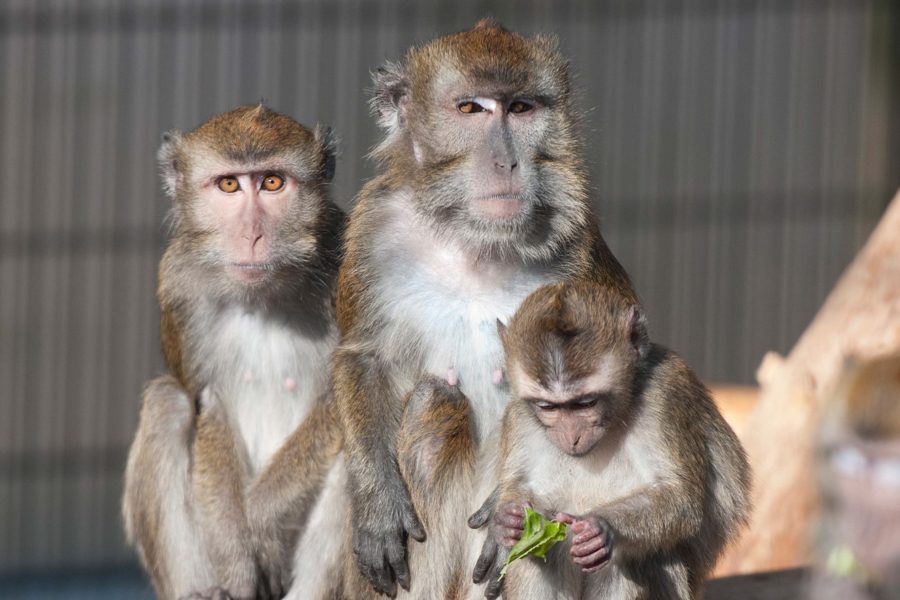Insights into the evolution of the sense of fairness
A sense of fairness has long been considered purely human – but animals also react with frustration when they are treated unequally by a person. For instance, a well-known video shows monkeys throwing the offered cucumber at their trainer when a conspecific receives sweet grapes as a reward for the same task. Meanwhile, researchers have observed similarly frustrated reactions to unfair rewards in wolves, rats and crows. However, researchers still debate the reasons for this behavior: Does the frustration really stem from a dislike of unequal treatment, or is there another explanation? In a study with long-tailed macaques (Macaca fascicularis), researchers at the German Primate Center – Leibniz Institute for Primate Research (DPZ) have now confirmed an alternative explanatory approach in a collaborative project involving the Departments of Cognitive Ethology and Neurobiology.

Long-tailed macaques (Macaca fascicularis) in the animal husbandry facility at the German Primate Center in Göttingen. Photo: Anton Säckl
Bernstein members involved: Hansjörg Scherberger
The team around Rowan Titchener, PhD student at the Georg-August-Universität Göttingen and researcher in the Department of Cognitive Ethology at the DPZ, showed that long-tailed macaques rejected an inferior reward more frequently if it is selected and allocated by a person. In contrast, if the reward is provided by an automatic feeder, they accept it. The researchers conclude that the monkeys refuse the reward out of social disappointment towards the experimenter – and not because they feel that they are at a disadvantage compared to a conspecific. (Royal Society Open Science).
Humans have a strong sense of equity. If we believe that resources are being unfairly or wrongly distributed, we make this clear – with protest. This controlling behavior promotes successful cooperation and partly explains why cooperation has been a winning strategy in human evolution.
Equal effort, same reward
However, not only humans protest when the same performance is rewarded differently for no apparent reason. Many animals are likewise dissatisfied with a reward that is perceived as comparatively inferior and react in a frustrated way. The characteristic behavioral patterns can be reliably reproduced in experiments across various species of birds, rodents and monkeys. The interpretation of this protest behavior, on the other hand, is controversial among researchers. If the animals’ frustration stemmed from a comparison of their own reward with that of their conspecific, this would indicate an abstract understanding of equal treatment.
The root of disappointment
In the present study, the researchers tested three alternative explanations for protest behavior following unequal treatment. The first hypothesis invokes “inequity aversion” and presupposes social comparison with conspecifics and a sense of fairness. This is based on the idea that the pattern of rewards is compared between oneself and others so that it may be perceived as unfair. The second hypothesis, “food expectation”, assumes the visibility of the attractive food as a trigger for frustration. Thus, if a high-quality reward is visible, the animal expects to receive it. The third hypothesis is based on “social disappointment” about the trainer’s decision to provide an inferior reward. Behind this stands an expectation to be rewarded in the best possible way by the responsible human.
Disappointing human
The results of the current study on long-tailed macaques are in line with a previously published chimpanzee study. Rowan Titchener, lead author of the study, states: “The animals’ response patterns are best explained by frustration with the human trainer’s decisions. Thus, the current results speak for the third hypothesis, based on social disappointment”. This interpretation is supported in particular by the fact that the long-tailed macaques accepted an inferior reward from an automatic feeder more often than from a human.
Experimental setup
The researchers confronted the monkeys with four different scenarios in the experiment. The procedure was always the same: The activation of a lever was followed by the reward of low-quality food, which was brought within reach by a small conveyor belt. High-quality rewards were displayed, but remained out of reach. The experimental design was varied in two ways: Firstly, either a human provided the reward, or it was administered by an automatic feeder; secondly, the animal was either alone, or a conspecific solved the same task within sight, but received higher-quality rewards.
Clear result
The monkeys almost never refused their reward when it was provided by the automatic feeder – but did so in more than 20 percent of the experiments in which a human offered the food. This behavioural pattern is consistent with social disappointment with the human who decides to give them the inferior reward. “The monkeys have no social expectations of a vending machine and are therefore not disappointed,” Titchener explains.
Stefanie Keupp, leader of the study at the German Primate Centre, draws the conclusion: “A combination of social disappointment with the human experimenter and some degree of food competition best explains the behavior of the long-tailed macaques in our study.”




